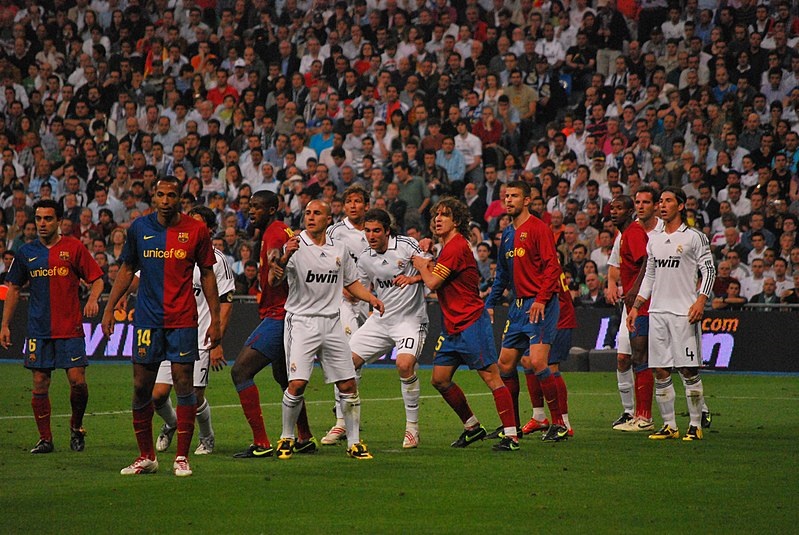The successes of soccer teams improve the social perception of immigration
The successes of soccer teams improve the social perception of immigration
The study is based on combining citizens’ opinions collected in eight editions of the European Social Survey with the results achieved by Spanish first division soccer teams. Full professors Ignacio Lago (UPF) and Carlos Lago (University of Vigo) are the authors of the research project, which was selected in a call by the “la Caixa” Social Observatory.

The success of a soccer club, whether by winning the league or performing better than would be expected on account of its budget, as well as a higher percentage of minutes played by foreign players, contributes to a better perception of immigration in the country or autonomous region where the team belongs.
This is the main conclusion of a study by Carlos Lago, full professor of Sports Science at the University of Vigo, and Ignacio Lago, full professor of Social and Political Sciences at Pompeu Fabra University, both researchers associated with the GEN (Governance and Economics Research Network) of the Galician university.
"The 'positive perception' of immigration was higher among the citizens of an autonomous community when one of its teams had won the league.
“The glories of immigration. How soccer wins shape opinion on immigration” was one of the eight projects on immigration selected in the 2019 announcement by the “la Caixa” Social Observatory and it is expected to be published soon as an article in a scientific journal. The study is based on combining citizens’ opinions collected in eight editions of the European Social Survey (ESS) with the results achieved by Spanish first division football teams.
The analysis included data collected between 2002 and 2016 by the ESS, a survey carried out every two years in different EU countries that considers a series of data on people’s perception of various social aspects. In particular, the researchers focused on the opinions of over 15,500 Spanish citizens in the eight editions analysed of a survey that asked their opinion on whether or not cultural life is enriched by immigrants or if immigration is good or bad for the country’s economy.
In turn, these data were interspersed with the results of the top-tier Spanish soccer league during the different seasons covering the study period. It took into account both the final classification and the relationship between the classification obtained and the budget of each team and the number of domestic and foreign players and minutes played by them.
The higher the team finishes, the better the perception
“What we find is that when teams are successful, either because they win the league, or because they perform better than expected taking their budget into account, and also if there are a lot of immigrant players who play for this team, this improves the positive perception of immigration”, the researchers state.
Specifically, they found that the “positive perception” of immigration was higher among the citizens of an autonomous community when one of its teams had won the league, which had been achieved in the period analysed by FC Barcelona, Real Madrid, Atlético Madrid and Valencia CF. “This is even more accentuated when more foreigners play more minutes”, the researchers assert.
According to Carlos and Ignacio Lago, this same correlation was detected when the factor analysed was the performance of clubs: specifically, if they finished the end of the season higher or lower than their rightful position if the teams were ordered according to budget.
Conversely, they also found the opposite effect, since “when a team does not win or performs worse than expected and there are a lot of immigrant players who play a lot of minutes, the perception of the benefits of immigration falls”.
Football as a social barometer and as a research field
Spain, the researchers say, is the European Union country with the third largest number of immigrants, about 415,000, according to Eurostat 2016, the last one analysed in this research. At the same time, football is “probably the most significant leisure product” of a country where, according to a survey by the Sociological Research Centre, 67% of people, 78% of men and 57% of women, say they follow a team.
Moreover, Spain has a league with a high percentage of foreign players who, according to the results of the last analysis conducted for the 2015-2016 season, played around 42% of the total minutes disputed. Hence, the researchers tried to see “how football regulates or changes people’s perception of the positive aspects of immigration”. Based on the results obtained, they highlight the role of soccer as a “social barometer” that, beyond sport, “allows us to understand many aspects of our daily lives”.
Therefore, the authors uphold this sport as “a great space for research”, while recognizing the difficulty involved in reaching this meeting point, in this case between social aspects and football, marked by their research project.
